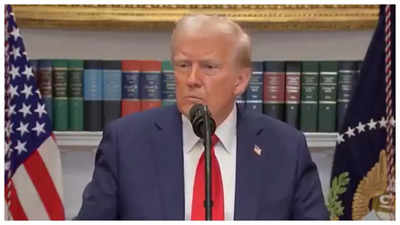- News
- Education News
- News
- Trump Education Department ends Biden era 'Book Ban Hoax' plan: What it means for school libraries across US
Trending
Trump Education Department ends Biden era 'Book Ban Hoax' plan: What it means for school libraries across US
The US Department of Education has dismissed 11 book ban complaints and removed a Biden-era position dedicated to investigating such cases. This decision shifts control to local schools and parents, sparking debate over censorship and representation in educational content. Advocacy groups express concerns about the potential impact on marginalized communities and diverse perspectives in school libraries.
The US Department of Education has officially dismissed 11 complaints related to planned "book bans" and eliminated a Biden-era position tasked with investigating such cases. Announced last week, the department’s decision also involves rescinding previous guidance aimed at addressing the removal of books from school libraries. This marks a significant shift in the federal government’s approach to the contentious issue of book censorship in schools.
Budget 2025 Updates
The complaints, now dismissed, had alleged that removing age-inappropriate, sexually explicit, or obscene materials from school libraries created a hostile environment for students. Central to these efforts during the Biden administration was the “book ban coordinator,” a role established to investigate cases of alleged unlawful book removals by school districts or parents. The Trump administration’s Education Department has not only removed this position but also signaled a broader effort to restore decision-making power to local schools and parents.
Rescinding the 'Book Ban Coordinator': A Restorative Move or a Controversial Step?
The Biden-era "book ban coordinator" was designed to address concerns that removing certain books—often those addressing LGBTQ+ themes or written by authors of color—violated civil rights laws by fostering environments perceived as exclusionary or discriminatory. The removal of this position represents a fundamental shift in how the federal government views its role in mediating such disputes. Acting Assistant Secretary for Civil Rights Craig Trainor described the decision as a restoration of the principle of local control, emphasizing that parents and teachers are best positioned to evaluate educational needs.
Understanding the Book Ban Debate
Opponents, however, argue that these efforts amount to censorship and disproportionately affect books that provide representation for LGBTQ+ individuals, people of color, and other marginalized groups. Advocacy groups claim that the removal of these books not only limits access to diverse stories but also fosters an environment of exclusion and ignorance, ultimately harming students’ ability to empathize with others and understand the world around them.
The Biden administration’s approach, through initiatives like the “book ban coordinator,” sought to address the perceived imbalance and ensure that decisions to remove books adhered to federal anti-discrimination laws. With the Trump administration’s rollback of these measures, the debate over censorship versus local control has re-emerged with renewed vigor.
What This Means for Schools and Libraries Across the US
The elimination of federal oversight in these matters shifts the responsibility of determining which books are available in school libraries entirely to local school boards, districts, and parents. For proponents of the change, this represents a victory for parental rights and local governance. It allows communities to shape their educational environments based on shared values and priorities without federal intervention.
However, critics warn that the absence of federal oversight could lead to a patchwork of policies across the country, with some areas embracing diverse collections while others enact stricter restrictions. This lack of consistency may leave students in some regions with access to a broader range of perspectives while others face limited exposure to diverse ideas and experiences.
The decision to rescind the guidance may also embolden efforts at the state and local levels to remove controversial books. In several states, legislation targeting books with LGBTQ+ themes or those discussing racism has already gained traction, leading to legal battles and public outcry. Advocacy groups fear that the removal of federal safeguards could accelerate such trends, making it more difficult to challenge decisions perceived as discriminatory.
Broader Implications for Educational Policy and Civil Rights
The Department of Education’s move raises broader questions about the federal government’s role in ensuring equitable access to education. By prioritizing local control, the Trump administration’s approach signals a departure from the idea that the federal government should act as a guarantor of student rights in cases of perceived censorship.
As debates over book bans and educational content continue to unfold, the long-term impact of these changes remains uncertain. What is clear, however, is that the issue is far from settled. Advocacy groups, parents, and policymakers will likely continue to clash over the balance between protecting children, preserving parental authority, and ensuring that schools remain spaces for free inquiry and the exploration of diverse ideas.
Stay updated with the latest education news on Times of India. Explore the CBSE date sheet for Class 10 and 12 across Arts, Science, and Commerce streams.
End of Article
FOLLOW US ON SOCIAL MEDIA





















